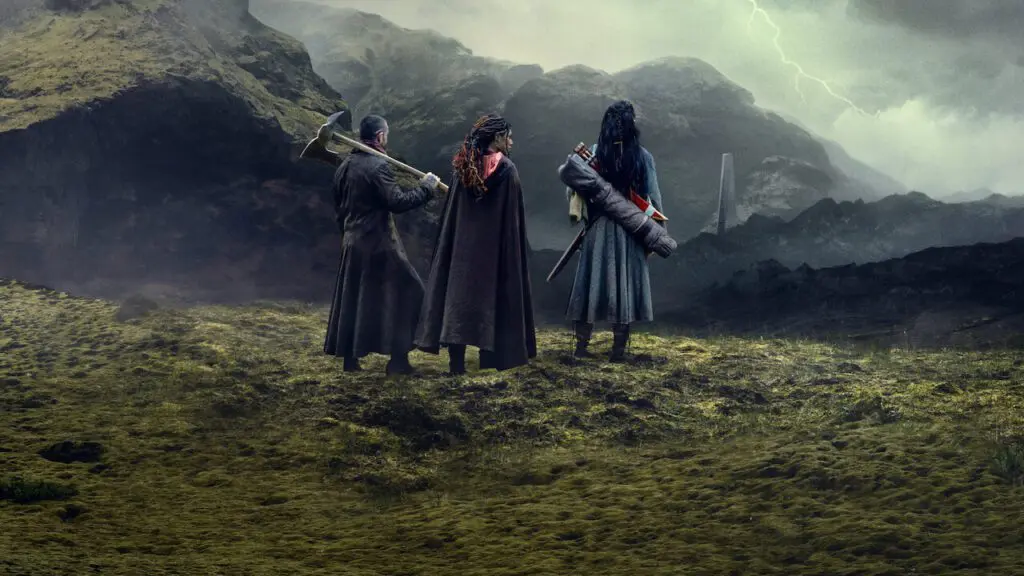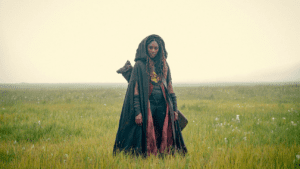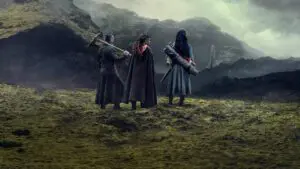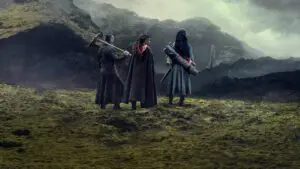Summary
The Witcher: Blood Origin delivers a pretty decent finale with a respectable amount of payoff and an important connection back to the main series.
It all comes back toXin’treain the finale of The Witcher: Blood Origin, which is probably fitting since so much political and magical power is concentrated there at this point that it wouldn’t make much sense to end things anywhere else. And as with the main series it all revolves around the monoliths and their ability to open portals to other realms. Merwyn wants to use them to start “colonizing” new worlds, by force if necessary. Balor, meanwhile, is looking for personal power above all else. He even sacrifices his apprentice, Fenrik, the person closest to him, as a means by which to achieve the chaotic power he’s seeking.
The gang infiltrates Xin’trea dressed as Golden Empire guards, and then they split up. Scian, as promised, takes Fjall to Merwyn, but the Empress isn’t buying the ruse. She keeps Fjall with her and orders Scian executed. Meanwhile, Eile leads the lowborn in revolt, capitalizing on their consistent mistreatment — they’re all starving, though the show hasn’t done a great job of showing this, instead choosing to mention it casually every now and again — and her reputation as the Lark.
This episode also further transforms Fjall. Since his prototype version of the Trial of the Grasses in Episode 3 was a bit ad-hoc, it’s basically a death sentence. The idea is to have him kill Balor’s beast before he himself becomes too monstrous, losing himself to the transformation. While he fights Balor’s beast, Eile confronts Merwyn, and Zacare and Syndril confront Balor, who is now very powerful, splitting the action into three distinct strands.
The resolution between Eile and Merwyn is simplest. The former stabs the latter and leaves the knife embedded within her, presenting her with a choice. She can either leave it and perhaps survive long enough to be helped, but face the consequences of her actions, or she can remove it and die like a coward. She chooses the second one, obviously.
The conclusion to the other two matters is much more significant. Fjall becomes more and more monstrous as he fights the beast, and while it’s eventually defeated, he loses himself, ripping Uthrok in half and then clubbing Brother Death to… well, death. Only Eile and her singing can calm him down slightly, but only long enough for her to stab him and put him out of his newfound misery.
Syndril’s plan is to merge with Balor and use that combined power to shatter the monolith, and again, this is successful but at a considerable cost. The shattering of the obelisk tears time and space apart, and the planes of existence begin to bleed into one another. This is the Conjunction of the Spheres. We see humans wash up on the shores, forcibly wrested from their own worlds, and we’re assured by the narration that nothing will ever be the same.
“Of Mages, Malice, and Monstrous Mayhem” then cuts to a few months later. Eile is pregnant with Fjall’s child, and she and Meldof are with Ithlinne, who lies a head on her belly and speaks another prophecy, this one about how the Lark’s blood shall carry forth the first note of a song that ends all times. And one of her blood shall sing the last, apparently. This is, once again, Blood Origin being tied to Ithlinne’s Prophecy.
And the connections don’t stop there! Blood Origin finally catches back up to its framing device, showing Jaskier finishing writing down the story recounted to him by Minnie Driver’s character, who implores him to sing the song of the seven so that they can find hope and strength in the story of their ancestors and be ready for the great change to come.
Finally, in a mid-credits scene, we see Avallac’h, holding Syndril’s monolith book, watching Ciri as she plays with the lowborn kids in the first season of The Witcher.
Read More: Who Dies in The Witcher: Blood Origin?




